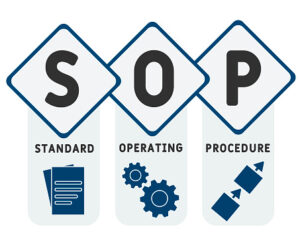Standard Operating Procedures (SOPs) are comprehensively drafted process flows which the organizations follow to instill smoothness in their operations while being on the road to achieving its goals and objectives.┬Ā We will be looking at some of the benefits an organization reaps throughout its lifecycle by having well-detailed SOPs for its various functions.
1. SOP ŌĆō A Pacemaker For Decision Making:
When an organization comes into the existence, it relies on its owner for most of the decisions to be taken. But this approach hampers the achievement of organizational goals in the long run when it is in a growing phase and decisions are to meant to be taken in quick succession to exploit the opportunities instead of waiting for the ownerŌĆÖs approval.
2. Effective Communication:
Well-drafted SOPs lay the strongest foundations for the implementation of basic guidelines of operating set by the owners of the organization. SOPs not only serve as a tool for removal of any ambiguities for task owners regarding how to achieve organizational goals but also aids in managing the bottlenecks of miscommunication and non-compliance with industry laws and regulations thus avoiding fines and penalties both internally (from organizationŌĆÖs authorities) and externally (law enforcers) in the case of waste management protocols, for example.
3. Enhanced Quality:
SOPs are intended to assure consistent, efficient, and high-quality delivery of services or production, regardless of who is involved in completing the hob ultimately. SOPs ingrain the culture of ŌĆśquality-first throughout the organization from initial order to final product delivery. Furthermore, binding the SOPs development guidelines with advanced performance management tools will further enhance the quality of the organizationŌĆÖs operations and prove to be the reason for the organization beating the competition altogether.
4. Improved HR Function:
The ŌĆśPeopleŌĆÖs ManagementŌĆÖ aspect has always been a hot topic of managing organizations. A lot of resources are consumed especially in the form of ŌĆśTimeŌĆÖ and ŌĆśMoneyŌĆÖ to enable the employees to act in the best of ways to carry-out organizational operations as automation is not practically and financially feasible to be implemented in 100% of the organizationŌĆÖs processes. Therefore, well-drafted SOPs remove the need for excessive training for staff but also serves as the tool for redirecting the organizational finance to more significant areas of operations which saves the crucial time of management as well.
┬Ā
5. Customer Relationship Management (CRM):
CRM has always been considered the most important fact while managing the operations of the organization. The organizations following the philosophy of ŌĆ£Customer is KingŌĆØ have seen exponential growth and success over the past decades. Similarly, there has always been a need to implement the procedures for ensuring customer satisfaction so that customers can engage with organizations in the future as well. Failure of the organization to treat the grieved customer put a strong question mark on the organization\’s growth going forward. Therefore, well-established guidelines on customer management like ŌĆśAfter-Sales ServicesŌĆÖ, ŌĆśFeedback InitiativesŌĆÖ will ultimately help the organization to improve on its weaknesses, build on its strengths, and outperform its competitors.






